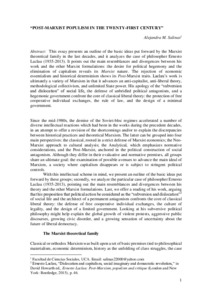Por favor, use este identificador para citar o enlazar este ítem:
https://repositorio.uca.edu.ar/handle/123456789/15286| Título: | Post-marxist populism in the twenty-first century | Autor: | Salinas, Alejandra M. | Palabras clave: | MARXISMO; FILOSOFIA POLITICA; CAPITALISMO; FILOSOFIA SOCIAL; DOCTRINAS FILOSOFICAS | Fecha de publicación: | 2022 | Editorial: | Ludwig von Mises Institute | Cita: | Salinas, A. M. Post-marxist populism in the twenty-first century [en línea]. En: Rasmussen, D. (ed.) Defending l iberty : essays in honor of David Gordon. Alabama : Ludwig von Mises Institute, 2022. ISBN: 978-1610167512. Disponible en: https://repositorio.uca.edu.ar/handle/123456789/15286 | Resumen: | Abstract: This essay presents an outline of the basic ideas put forward by the Marxist theoretical family in the last decades, and it analyzes the case of philosopher Ernesto Laclau (1935-2013). It points out the main resemblances and divergences between his work and the other Marxist formulations: the desire for political hegemony and the elimination of capitalism reveals its Marxist nature. The rejection of economic essentialism and historical determinism shows its Post-Marxist traits. Laclau’s work is ultimately a variety of Marxism in that it advances an anti-capitalist, anti-liberal theory, methodological collectivism, and unlimited State power. His apology of the “subversion and dislocation” of social life, the defense of unbridled political antagonism, and a hegemonic government confront the core of classical liberal theory: the protection of free cooperative individual exchanges, the rule of law, and the design of a minimal government. Since the mid-1980s, the demise of the Soviet-bloc regimes accelerated a number of diverse intellectual reactions which had been in the works during the precedent decades, in an attempt to offer a revision of the shortcomings and/or to explain the discrepancies between historical practices and theoretical Marxism. The latter can be grouped into four main perspectives: the classical, rooted in a strict defense of Marxist economics; the Neo-Marxist approach to cultural analysis; the Analytical, which emphasizes normative considerations, and the Post-Marxist, anchored in the political construction of social antagonism. Although they differ in their evaluative and normative premises, all groups share an ultimate goal: the examination of possible avenues to advance the main ideal of Marxism, a society where capitalism disappears or is subject to stringent political controls. | URI: | https://repositorio.uca.edu.ar/handle/123456789/15286 | ISBN: | 978-1610167512 | Disciplina: | FILOSOFIA | Derechos: | Acceso abierto | Fuente: | Rasmussen, D. (ed.) Defending l iberty : essays in honor of David Gordon. Alabama : Ludwig von Mises Institute, 2022 |
| Aparece en las colecciones: | Libros/partes de libro |
Ficheros en este ítem:
| Fichero | Descripción | Tamaño | Formato | |
|---|---|---|---|---|
| post-marxist-populism.pdf | 448,01 kB | Adobe PDF |  Visualizar/Abrir | |
| 9fab0b49-3401-4cc8-b0bd-b8cb55027b33.jpeg | 36,89 kB | JPEG |  Visualizar/Abrir |
Visualizaciones de página(s)
80
comprobado en 27-abr-2024
Descarga(s)
421
comprobado en 27-abr-2024
Google ScholarTM
Ver en Google Scholar
Altmetric
Este ítem está sujeto a una Licencia Creative Commons

